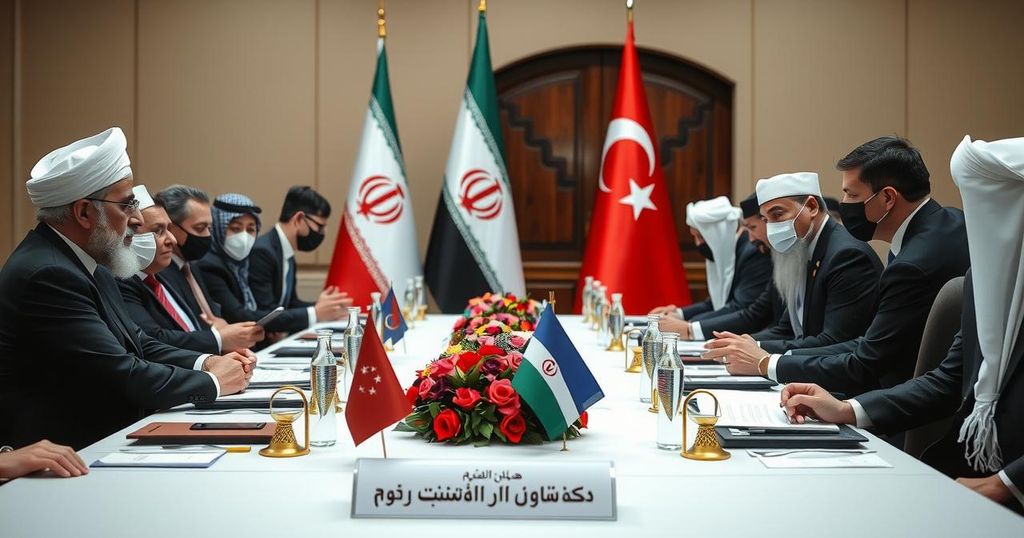Egypt hosted the presidents of Turkey and Iran at the D-8 summit, signaling the rising influence of non-Arab actors in the Middle East. The meeting addressed critical issues, including Houthi attacks impacting the Red Sea and the ongoing Gaza conflict, while highlighting evolving relations between Egypt and Iran following years of tension.
On Thursday, Egypt hosted a significant summit involving the leaders of Turkey and Iran, part of the eight-member Developing-8 (D-8) group of Muslim-majority nations. The event, taking place in Egypt’s New Administrative Capital, reflects the shifting dynamics in the Middle East where non-Arab nations, namely Turkey and Iran, are increasingly influencing regional affairs. This summit occurs amid a backdrop of turmoil following a year of conflict in Gaza, impacting Iranian-backed groups such as Hamas and Hezbollah, and amidst ongoing tensions surrounding the Syrian regime. This meeting marks a notable occasion, as it is the first time since the recent overthrow of the Syrian government that Turkish President Recep Tayyip Erdogan and Iranian President Masoud Pezeshkian will meet. Notably, this visit is also Pezeshkian’s first to Egypt since 2013, indicating a rare diplomatic engagement between the two nations after years of estrangement.
At this summit, President Abdel Fattah El Sisi of Egypt is expected to discuss the impact of Houthi attacks on shipping in the Red Sea, which have significantly hampered Egypt’s revenue from the Suez Canal. The broader issues of the Gaza conflict and the influence of Hezbollah, significantly weakened by recent military actions, were also deemed critical to the agenda. Recent efforts by Egypt to normalize relations with Iran have not yet led to a diplomatic elevation to ambassadorial status, with continuing tensions over Iran’s involvement in the region.
The D-8 summit, which includes nations such as Nigeria, Pakistan, and Malaysia, aims to enhance collaboration among member states and tackle pressing regional challenges, focusing notably on the situation in Gaza and Lebanon. While Egypt and Turkey have made strides to mend their strained relations, they remain at odds regarding the ongoing conflicts in Libya and Sudan. The cooperation on security and shared intelligence between the two countries has evolved alongside their economic partnership, showcasing a complex yet evolving diplomatic landscape in the Arab world.
The Developing-8 (D-8) group, comprising eight predominantly Muslim nations, seeks to enhance economic cooperation among member countries, strengthening ties in response to regional and global challenges. Turkey and Iran, two of the member countries, have historically influenced Middle Eastern geopolitics, particularly concerning the ongoing conflicts in Gaza and Syria. The recent summit takes place against a backdrop of weakened Iranian proxies and shifting power dynamics in the Middle East, where traditional Arab leadership is increasingly challenged by non-Arab actors. Egypt’s efforts to assert its regional role are further complicated by its longstanding tensions with Iran, complicated by Iran’s support for militias that oppose Egyptian interests, along with Ankara’s own regional ambitions.
The summit in Egypt represents a pivotal moment for the Developing-8 countries and highlights the evolving geopolitical landscape in the Middle East, where non-Arab nations like Turkey and Iran cement their influence. The discussions on security issues, particularly related to the Red Sea and Gaza, reflect burgeoning cooperation amid efforts to navigate complex regional conflicts. While relations between Egypt and Iran are improving, underlying tensions persist, indicating the challenges ahead in fostering stability and cooperation in the region.
Original Source: www.thenationalnews.com






